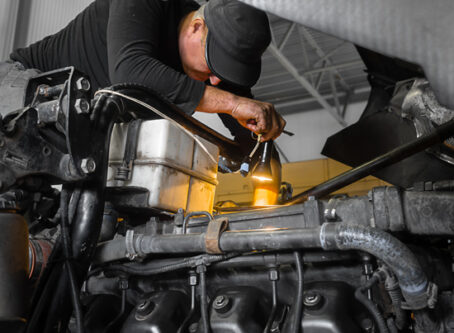OOIDA: Indiana overweight truck bills ‘pick winners and losers’
Two bills introduced in the Indiana General Assembly would accommodate more overweight trucks for travel around the state.
Lewie Pugh, executive vice president for the Owner-Operator Independent Drivers Association, recently sent a letter to some lawmakers in Indiana opposing the bills.
Pugh said that lawmakers caving to pressure to loosen truck size and weight exemptions are “nothing new.”
“At the behest of economic interests that want to ship cheap freight, there is no shortage of state lawmakers willing to pick winners and losers,” Pugh said.
Sponsored by House Roads and Transportation Chairman Jim Pressel, R-Rolling Prairie, HB1190 would authorize the Indiana Department of Transportation to issue overweight truck permits. The rule would not apply to highways under a local authority’s jurisdiction.
The bill reads that applications for permits must demonstrate that rail travel for the resource is not an option; “other transportation options that do not include travel using a permit have been exhausted; and as a result of the lack of transportation options for this resource, supply chain interruptions or supply dock backlogs exist.”
HB1190 awaits consideration in the House Roads and Transportation Committee.
Overweight divisible loads
Another bill in the Senate Homeland Security and Transportation Committee covers overweight divisible loads.
Existing state law authorizes trucks hauling metal commodities to be permitted up to 120,000 pounds. Additionally, loads of bark, logs, sawdust, wood chips, or agricultural commodities are permitted up to 97,000 pounds for transport from the point of harvest to the point of first destination.
Sponsored by Sen. Jon Ford, R-Terre Haute, SB40 would expand the category of freight that can be considered an overweight divisible load. The provision would authorize transportation of commodities up to 120,000 pounds.
The bill states that affected loads “must have a total equivalent single axle load calculation that is equal to or less than 2.8 equivalent single axle load.”
Additionally, haulers must also apply for and be granted a permit for transportation of divisible loads in excess of 80,000 pounds.
OOIDA disputes claim that heavier trucks are needed.
“Trucking already suffers from overcapacity – too many trucks, trailers, and drivers,” Pugh wrote in a letter Thursday to Pressel.
He said his point is reflected by wages, working conditions, and rampant driver turnover.
“Rather than address real trucking issues, you are leading the charge on a bill that will hasten the deterioration of Indiana’s already crumbling infrastructure, reduce margins of safety, and ultimately give a competitive advantage to the largest economic interests in trucking,” Pugh wrote. LL









